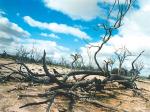New science degrees to back Australia's ability
Four new science degrees are being offered at the University of Adelaide in 2005. The new degrees are aimed at equipping graduates with the knowledge and skills to contribute to key areas of future need, as highlighted by the Federal Government. Among the key areas identified by the government's "Backing Australia's Ability" initiative are: an Environmentally Sustainable Australia; Frontier Technologies in Building & Transforming Australian Industries; and Safeguarding Australia. The four new degrees that will support these
areas are: - Bachelor of Science (EcoChemistry)
- Bachelor of Science (Evolutionary Biology)
- Bachelor of Science (Nanoscience and Materials)
- Bachelor of Science (Sustainable Environments)
"The University of Adelaide's Faculty of Sciences has a strong research focus, which results in teaching programs informed by cutting-edge knowledge and use of state-of-the-art technology," said the Executive Dean of the Faculty of Sciences, Professor Peter Rathjen. "Each of our new degrees has been carefully structured to incorporate the research expertise in Sciences here at the University, and have been established to respond to the demand for graduates in these areas. "For many years the University of Adelaide has had talented and internationally recognised scientists in the field of nanoscience, who have delivered courses in Chemistry through our Bachelor of Science. In the new degree, Bachelor of Science (Nanoscience and Materials), students will be able to choose a study option that is directly tailored to their interests in this exciting new field. "Likewise, our other degrees in EcoChemistry, Evolutionary Biology and Sustainable Environments build on years of excellence in teaching and research, as well as a perceived need for more graduates in these fields. "Students who enrol in these degrees will benefit from the combination of world-class research expertise and innovative teaching practices, resulting in high-quality educational outcomes," Professor Rathjen said. More information about study options in Sciences will be available at the University of Adelaide's Open Day - Sunday, August 15.
Bachelor of Science (Nanoscience and Materials) This exciting field will help shape the future of technology in almost all aspects of our lives, and will revolutionise current manufacturing practices in areas such as the food industry, human and animal health, and communications. The focus of this degree is the design and manipulation of materials at a molecular level. Students will develop an understanding of the design requirements for a range of advanced materials such as polymers, catalysts, molecular wires and optical switches and sensors.
Bachelor of Science (Sustainable Environments) Environmental sustainability is at the core of all modern management practices of our national parks and reserves, Aboriginal lands, agricultural areas, and mining regions. The University of Adelaide is recognised both nationally and internationally for its research strength in the environmental sciences. Students will gain an appreciation for the underlying principles of the sustainable use of the environment, including an understanding of the social, ethical and economic aspects of natural resources and management. There are three major areas of study in the program: Conservation and Wildlife Ecology; Land and Water Management; and Deep Earth Resources.
Bachelor of Science (EcoChemistry) This new degree highlights the importance of chemical principles in understanding our environment. The program will cover a wide range of contemporary environmental issues including the greenhouse effect, variations in the ozone layer, the use of pesticides and air, water and soil pollution. Students will develop an understanding of the ways in which chemists propose to solve environmental problems, including the development of alternative technologies resulting in more environmentally friendly solutions than those currently available.
Bachelor of Science (Evolutionary Biology) Evolutionary Biology involves the study of the fossil record and information contained in living plants and animals to determine how they evolved. This knowledge assists in understanding biodiversity and planning for its conservation. This program, which provides access to South Australian Museum staff and collections, is unique in South Australia, and is designed to deliver internationally competitive training.
For more information about any of these new degrees contact the Faculty of Sciences: phone (08) 8303 5673, email: faculty.sciences@adelaide.edu.au or visit the website www.sciences.adelaide.edu.au
|





